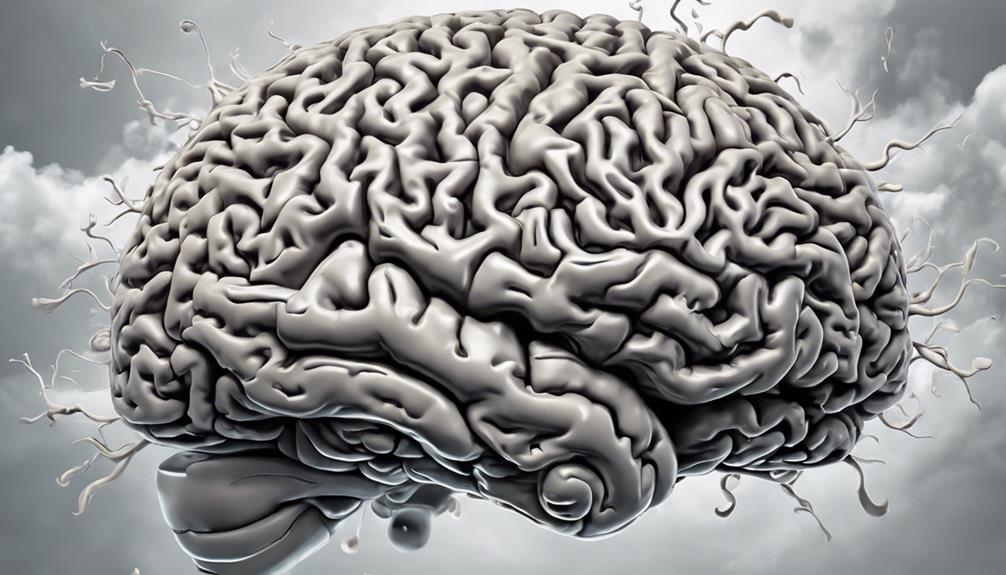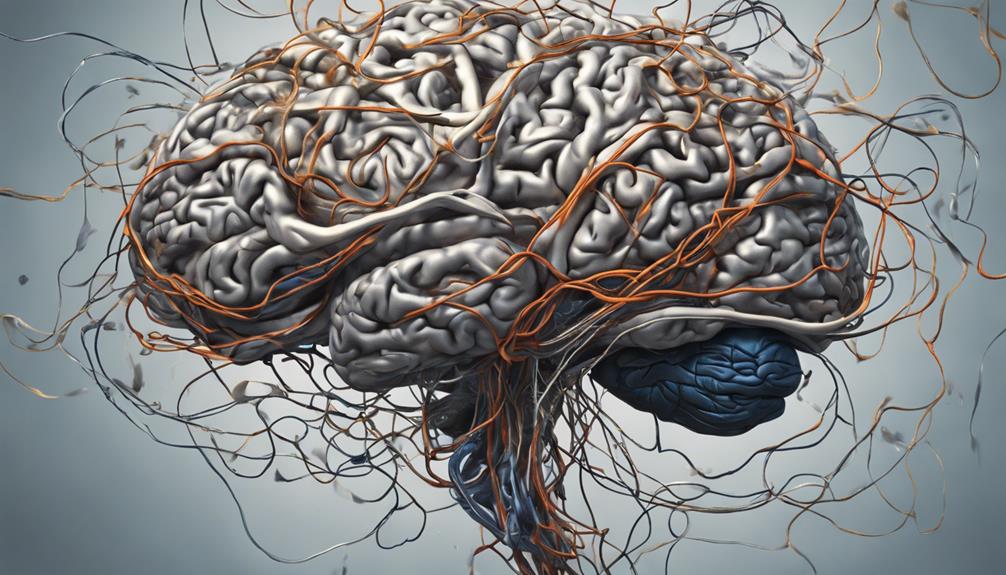Anxiety can harm our memory, causing memory loss and making it challenging to remember things. When we feel anxious, stress hormones like cortisol can mess with how our memory works. This can lead to trouble recalling information and remembering details. If anxiety sticks around for a long time, it might even cause lasting problems with memory and how well our brain functions. To help our memory cope better, learning to manage anxiety is key. By understanding how anxiety affects memory, we can take steps to support our brain health and improve our ability to remember things accurately.
Key Takeaways
- Anxiety can impair memory encoding and retrieval processes.
- Chronic anxiety leads to elevated cortisol levels affecting memory function.
- High anxiety levels can hinder accurate memory retrieval.
- Anxiety-related cognitive impairments extend beyond memory issues.
- Managing anxiety through therapy and stress reduction techniques can improve memory function.
Impact of Anxiety on Memory
Anxiety impacts memory by interfering with key cognitive processes, such as working and short-term memory retention. When we experience anxiety, our bodies release stress hormones like cortisol, which can negatively affect our memory. High cortisol levels from anxiety can impair memory retention and recall, making it harder for us to remember important information. Additionally, chronic stress caused by anxiety can lead to long-term memory issues and cognitive decline over time.
Furthermore, anxiety can also affect our working memory performance, which is vital for tasks that require us to hold and manipulate information temporarily. When we're anxious, our cognitive function can be compromised, making it harder to concentrate and remember things accurately. This can result in forgetfulness and confusion in daily tasks, impacting our overall cognitive abilities. Managing anxiety effectively is crucial to protect our memory and cognitive functions in the long run.
Role of Cortisol in Memory

Cortisol, referred to as the stress hormone, plays a pivotal role in how our memory functions. When anxiety triggers an increase in cortisol levels, it can negatively impact our ability to remember things.
Understanding how cortisol affects memory can help us explore ways to manage stress and preserve our cognitive abilities.
Cortisol Impact on Memory
Elevated levels of the stress hormone cortisol can negatively impact memory formation and retrieval processes. When we experience chronic anxiety, our bodies release high levels of cortisol, which can lead to memory impairment and cognitive decline over time.
This happens because constant stress keeps cortisol levels elevated, disrupting memory consolidation and retrieval. Excessive cortisol triggered by anxiety activates the fight-flight-freeze response, shifting resources away from memory functions. As a result, individuals may struggle with forgetfulness and have difficulties recalling information when cortisol levels remain high due to chronic anxiety.
Stress Hormones Role
When stress hormones like cortisol persist at high levels, they can interfere with memory processes. This means that when we experience chronic anxiety, elevated levels of cortisol can lead to memory impairment. Here are some key points to ponder regarding the role of cortisol in memory:
- Chronic anxiety can result in sustained high cortisol levels, impacting memory retention and recall.
- The continual release of cortisol due to constant stress can keep our bodies in a heightened state, affecting normal memory functions.
- Elevated cortisol levels caused by anxiety can disrupt typical memory processes, influencing cognitive performance.
- The fight-flight-freeze response triggered by cortisol during chronic anxiety situations may contribute to memory difficulties.
Anxietys Effect on Encoding
Anxiety disrupts the brain's encoding process for forming new memories, impacting attention and memory storage. When we experience high levels of anxiety, our ability to focus and process information effectively can be compromised. This means that the brain may struggle to encode new memories properly, leading to difficulties in memory storage.
The release of stress hormones during anxious moments can further interfere with the brain's encoding function, making it harder for us to form new memories efficiently. As a result, individuals dealing with anxiety may experience memory gaps and forgetfulness in their daily lives.
It's important to recognize the impact that anxiety can have on our ability to encode information and take steps to manage stress levels to support healthy memory function. By addressing anxiety and its effects on encoding, we can improve our overall memory performance and cognitive well-being.
Anxiety and Memory Retrieval

Experiencing elevated levels of stress can greatly impact our ability to retrieve memories accurately. When anxiety levels are high, our memory retrieval process may become challenging, leading to difficulties in recalling specific information.
This can result in forgetting task instructions or important details, making it harder to remember conversations or directions. In academic settings, anxiety-related memory retrieval issues can affect performance by hindering the ability to recall textbook information during exams or class discussions.
Additionally, elevated cortisol levels from chronic anxiety can worsen memory retrieval difficulties, contributing to more frequent memory lapses. It's important to manage anxiety levels to support better memory retrieval and overall cognitive function.
Chronic Anxiety and Cognitive Impairments

Chronic anxiety can greatly impair cognitive functions, leading to memory retention and recall difficulties. When someone experiences ongoing anxiety, it can have lasting effects on their ability to remember things and process information. This can result in long-term memory issues and a decline in cognitive abilities over time. The continuous release of cortisol, a stress hormone triggered by chronic anxiety, can further hinder memory functions and overall cognitive performance. Individuals struggling with chronic anxiety may find it challenging to concentrate, learn new things, and retain information effectively.
These cognitive impairments can extend beyond memory problems and affect daily functioning, making it harder to perform tasks that were once routine. Simple activities may become more difficult, impacting the quality of life for those dealing with chronic anxiety. It's essential to address these cognitive challenges early on and seek support to manage anxiety effectively, promoting better cognitive health and overall well-being.
Stress Hormone Cortisol and Memory

Elevated levels of the stress hormone cortisol, triggered by anxiety, can negatively impact our memory function.
When we experience chronic anxiety, our bodies may maintain high levels of cortisol, which can disrupt our ability to remember things.
Cortisol plays a role in preparing our bodies for stressful situations, potentially affecting how we recall information.
Cortisol and Memory Connection
When under prolonged stress, the impact of cortisol on memory can be significant. This stress hormone, cortisol, plays an essential role in memory function.
Here are four key points to remember about the connection between cortisol and memory:
- High cortisol levels resulting from chronic anxiety can impair memory function.
- The fight-flight-freeze response triggered by cortisol can lead to memory issues over time.
- Mild anxiety may provide a temporary memory boost, but chronic anxiety disrupts memory consolidation.
- Constant activation of the stress response due to high cortisol levels can hinder memory recall and cognitive function.
Understanding how cortisol affects memory can help manage stress levels and support cognitive well-being.
Impact of Stress Hormones
Excessive stress hormones, particularly cortisol, can detrimentally impact memory function by disrupting important brain processes involved in memory formation and retrieval. When cortisol levels remain high due to chronic stress, they can lead to long-term memory issues and cognitive decline.
The constant activation of the fight-flight-freeze response keeps the body in a heightened state, affecting memory processing. Prolonged stress and anxiety can result in a persistent release of cortisol, which hinders the brain's ability to consolidate memories effectively. This interference with memory consolidation and retrieval can have a substantial impact on overall cognitive function.
It's essential to manage stress levels to prevent the negative effects of high cortisol on memory and cognitive processes.
Anxiety-Related Working Memory Issues

Our research highlights the harmful impact of anxiety on working memory performance, especially in tasks requiring visuospatial processing. When anxiety levels are high, cognitive function related to working memory can be greatly affected.
Here are four key points to keep in mind:
- Anxiety Levels: Elevated anxiety levels have been associated with lower performance in working memory tasks, particularly those involving visuospatial skills.
- Chronic Stress: Prolonged exposure to stress and anxiety can hinder working memory processes in individuals who aren't experiencing depression.
- Cognitive Function: Understanding the effects of stress and anxiety on working memory is essential for maintaining overall cognitive function, especially in non-depressed adults.
- Memory Performance: Anxiety and stress can adversely affect various aspects of memory performance, including verbal, visuospatial, and n-back tasks.
Cognitive Function Impacts of Anxiety

When anxiety strikes, it can impact our cognitive function in various ways.
Anxiety has the potential to disrupt memory retrieval processes, making it harder to remember things when we're anxious.
Additionally, anxiety can lead to attention deficits, causing difficulties in focusing on tasks and information.
Anxiety and Memory Retrieval
Anxiety's impact on memory retrieval can greatly disrupt cognitive function, leading to challenges in recalling specific details or instructions. When anxiety affects memory retrieval, it can manifest in various ways:
- Forgetting conversations, directions, or scheduled events becomes more common.
- Trouble recalling information from textbooks or work-related tasks may increase.
- Cognitive disruptions induced by anxiety can cause gaps in memory recall.
- Daily functioning and task performance may be negatively affected by the impact of anxiety on memory retrieval.
Understanding how anxiety influences memory retrieval is important for managing anxiety effectively and maintaining peak cognitive function and memory retention.
Anxiety-induced Attention Deficits
Anxiety often causes attention deficits that greatly impact cognitive function. When experiencing anxiety and stress, individuals may struggle with focusing and maintaining attention, leading to memory problems and forgetfulness. These anxiety-induced attention deficits can disrupt cognitive processes like encoding and retrieval, hindering effective memory retention. Addressing anxiety-related attention issues is essential for improving overall cognitive performance. To better understand the impact of anxiety on cognitive function, let's explore the table below:
| Cognitive Function Impacts of Anxiety | |
|---|---|
| Challenges | Solutions |
| Attention deficits | Practice mindfulness and deep breathing exercises |
| Memory problems | Establish a consistent study routine |
| Disrupted encoding and retrieval | Seek professional help and guidance |
Addressing Anxiety for Memory Improvement

To enhance memory function in individuals struggling with memory issues, seeking professional help for anxiety is a proactive step towards addressing the underlying causes. Here are some effective ways to address anxiety for memory improvement:
- Mindfulness Practices: Engaging in mindfulness practices can help reduce anxiety levels, leading to enhanced memory function. Techniques like deep breathing and meditation can calm the mind and improve focus, aiding in memory retention.
- Social Support: Building a strong support network can positively impact memory coping strategies. Talking to friends, family, or a counselor about anxiety can provide emotional support and practical advice for managing stress and improving memory.
- Memory-Enhancing Activities: Participating in memory-enhancing activities, such as puzzles or brain games, can help combat memory loss associated with anxiety. These activities stimulate the brain, keeping it active and improving memory recall.
- Stress Management Techniques: Establishing a routine that includes stress management techniques like exercise, proper sleep, and relaxation can promote memory retention and improvement. Managing stress effectively can alleviate anxiety and enhance overall cognitive function, contributing to better memory.
Managing Anxiety-Induced Memory Problems

Addressing memory issues exacerbated by anxiety involves implementing effective strategies to manage anxiety-induced memory problems. Engaging in relaxation techniques such as deep breathing can help alleviate the impact of anxiety on memory.
Developing a consistent sleep schedule is essential in combating memory problems exacerbated by anxiety. Practicing mindfulness and meditation can reduce stress levels that contribute to memory difficulties, improving overall cognitive function. In addition, addressing potential underlying conditions such as the sleep apnea and anxiety link can play a vital role in improving both sleep quality and memory retention. Sleep apnea disrupts rest, which may intensify anxiety symptoms and cognitive challenges, creating a cyclical effect. By identifying and managing such issues alongside cultivating mindfulness, individuals can support better mental clarity and resilience.
Seeking therapy or counseling to address underlying anxiety can lead to significant improvements in memory function by tackling the root cause. Incorporating regular physical activity into your routine is beneficial for boosting cognitive function and mitigating the negative effects of anxiety on memory.
Frequently Asked Questions
How Does Anxiety Affect Memory Problems?
Anxiety impacts memory by increasing cortisol levels, leading to memory impairment. Sleep deprivation from anxiety worsens memory recall. Hyperstimulation due to anxiety causes forgetfulness and confusion, affecting memory retention. Chronic anxiety has lasting effects on memory, hindering daily tasks.
What Is the 3 3 3 Rule for Anxiety?
Engage your senses with the 3 3 3 rule for anxiety: identify three things you see, hear, and feel. This grounding technique calms the mind, promoting mindfulness and relaxation. It's a simple, effective method to manage anxiety.
How Does Anxiety Affect the Brain?
Anxiety impacts the brain by increasing cortisol levels, impairing memory function. Chronic anxiety can lead to long-term memory issues and cognitive decline. Lack of sleep due to anxiety hinders memory consolidation and retrieval. Anxiety-induced hyperstimulation causes forgetfulness and confusion.
How Long Does Anxiety Brain Fog Last?
Anxiety brain fog can linger for varying lengths, influenced by stress levels and coping methods. It may clear once triggers are managed. Chronic anxiety can prolong fog, impacting memory. Seeking help and self-care can aid in reducing its duration.
Conclusion
To sum up, anxiety can have a significant impact on memory, affecting both encoding and retrieval processes. Chronic anxiety may lead to cognitive impairments and working memory issues. It's important to address anxiety in order to improve memory function.
By managing anxiety-induced memory problems, individuals can enhance their cognitive abilities and overall well-being. Remember, taking steps to reduce anxiety can lead to better memory retention and recall.
How will you prioritize managing anxiety for improved memory?









